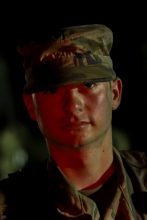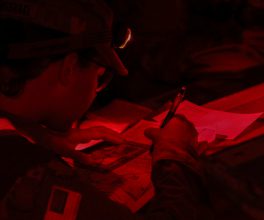FORT KNOX, KY. – “At the end of the day when your computers are not working or you are not getting any signal, you are going to have to navigate by yourself with your map,” said Cadet Joseph Lippoli, University of Kansas. “So it is important that all future platoon leaders have this ability so they will be able to move their [soldiers].

An 8th Regiment Advanced Camp Cadet prepares to head back to the starting point after locating his points at Fort Knox. Ky., July 2. Cadets had two hours to find their points, but only had to find one in order to pass | Photo by Matthew Billiot, CST Public Affairs Office
During the Night Land Navigation test, Cadets from the 8th Regiment Advanced Camp learned how to navigate terrain without a GPS. Although they only needed one point to pass, Cadets had two hours to locate two points.
Cadets were on their own and unable to ask for help from Cadre or other Cadets.
Lipppoli, who located one point in 30 minutes, said, “Trust your training, if you have confidence in yourself you are going to knock it out pretty easy.”
Cadet Harrison Collar, from the University of Wisconsin Oshkosh, was able to find both points in less than 45 minutes.

After completing his Night Land Navigation test, 8th Regiment Advanced Camp Cadet Todd Desmarias, from the University of New Hampshire, waits for the rest of his company to return from the Land Navigation. | Photo by Matthew Billiot, CST Public Affairs Office
He said his strategy was, “right off the bat, I plot my points, and then I try to find an intersection at a tag point. From there it is my new start point then I can find the distance to where I mark my point one. Then I go off the road from that intersection or tag point.”
The most difficult part for Collar was being able to see in the dark. He heard many people say do not bring a cellphone to Night Land Navigation, and he recommends the same thing. “Trust in yourself and be confident,” said Collar.
Cadet Todd Desmarais located both points in 50 minutes. He said, “The University of New Hampshire prepared all of the Cadets well. We did a lot of training with land navigation, so when we came through this it was just another day.”
He went through Night Land Navigation with ease and had no problem. “No matter how hard you think it is going to be, it is just one day. You will survive and you will adapt,” said Desmarais.
Desmarais believes that this test builds courage in Cadets and, “You have to start somewhere and that starting somewhere is with you.”

An 8th Regiment Advanced Camp Cadet plots her points at the start of the Night Land Navigation Test at Fort Knox, Ky., July 2. Cadets had two hours to find their points, but only had to find one in order to pass | Photo by Matthew Billiot, CST Public Affairs Office
Cadet Mason Wikoff, from Baylor University, experienced night land navigation for the first time tonight and said it was “quite an experience. It was different not seeing anything and relying on some of [my] other senses I have not used before.”
The most challenging part for Wikoff was “relying on what my gut instinct was on my plots and believing it was right no matter what I saw around me.”
Wikoff says not to let CST be the first time you do Night Land Navigation.
“It might sound silly, but it is a little bit nerve wrecking going out there yourself, so you become confident in yourself and in the skills that you are building which is an important part in leadership,” Wikoff said. “You have to be confident in what you know.”




